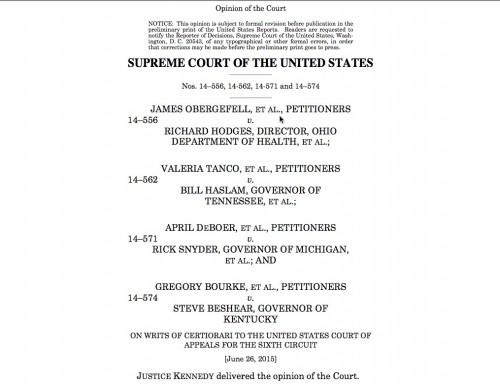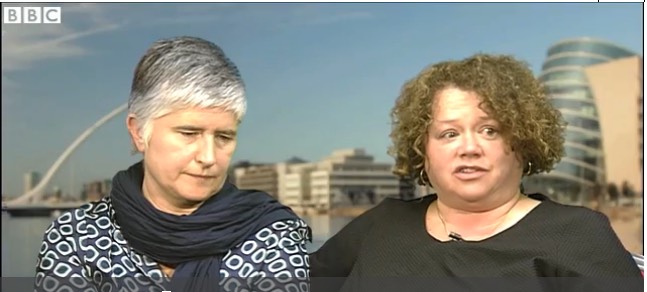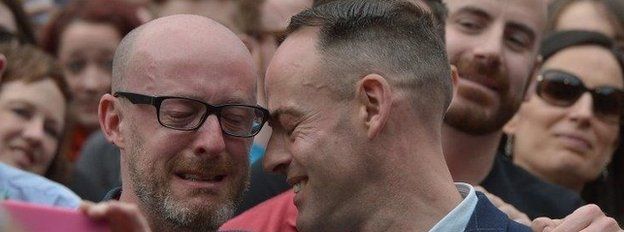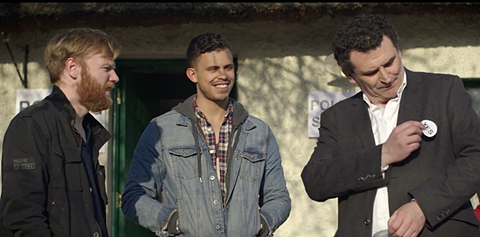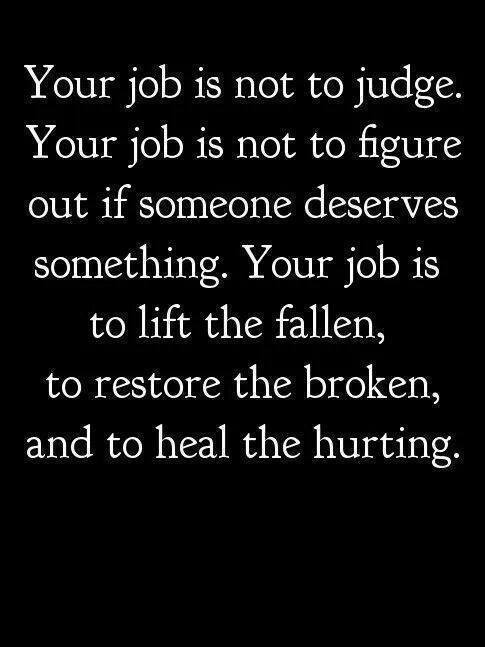A Catholic University Wishes Professor “Many Blessings” After He Marries His Same-Sex Partner
“Same-sex unions are now the law of the land, and Professor Hornbeck has the same constitutional right to marriage as all Americans,” said a statement from New York’s Fordham University after the marriage of its theology department chairman.

A Catholic university in New York City has said it will take no action against the chair of its theology department after he married his same-sex partner on June 27, in contrast to the several parochial K-12 schools that have fired gay and lesbian employees who marry.
The marriage of Fordham University Theology Professor J. Patrick Hornbeck and Patrick Bergquist — who directs the family ministry of St. Bartholomew’s Episcopal Church in Manhattan — was announced in the “Weddings” section of the New York Times the day after their ceremony.
In response to an inquiry from BuzzFeed News, Fordham University provided a statement from Senior Director of Communications Bob Howe saying that university wished the best for Hornbeck and his husband.
“While Catholic teachings do not support same-sex marriage, we wish Professor Hornbeck and his spouse a rich life filled with many blessings on the occasion of their wedding in the Episcopal Church. Professor Hornbeck is a member of the Fordham community, and like all University employees, students and alumni, is entitled to human dignity without regard to race, creed, gender, and sexual orientation,” Howe said in a statement that had been released previously. “Finally, same-sex unions are now the law of the land, and Professor Hornbeck has the same constitutional right to marriage as all Americans.”
Fordham’s response to Hornbeck’s marriage has been attacked in a number of conservative Catholic websites over the past two weeks, apparently beginning with Patheos.
Fordham University describes itself as “both Catholic and Jesuit” in identity, and invokes Catholic doctrine in other areas, including prohibiting the distribution of birth control.
“As an institution in the Catholic, Jesuit tradition, Fordham University follows Church teachings on reproductive issues,” states the university’s student handbook. “Distribution of contraceptives, contraceptive devices and/or birth control, in any form, is prohibited on Fordham University property and at University-sponsored events.”
The New York Archdiocese did not immediately respond to a request for comment on Fordham’s response to Hornbeck’s marriage. Neither Hornbeck nor his husband could be reached for comment.
Hornbeck’s marriage follows controversies in several archdiocese around the country where gay and lesbian teachers at Catholic K-12 schools have been fired after marrying their same-sex partners. The most recent firing to make national news was at the Waldron Mercy Academy just outside Philadelphia, where the archdiocese will host a large family summit in September that is schedule to include a visit by Pope Francis.
The Academy notified parents at the end of the school year that it was not renewing the contract of its longtime director of religious education, Margie Winters, because of her marriage to Andrea Vettori. Vettori appealed directly to the pope to intercede in a letter made public on July 1.
Philadelphia Archbishop Charles Chaput praised Winters’s firing as showing “character and common sense at a moment when both seem to be uncommon.”
Complete Article HERE!
We WON!
Complete Text HERE!
Church in Ireland needs ‘reality check’ after gay marriage vote
One of Ireland’s most senior Catholic clerics has called for the Church to take a “reality check” following the country’s overwhelming vote in favour of same-sex marriage.
The first gay marriages are now likely to take place in the early autumn.
Diarmuid Martin, the archbishop of Dublin, said the Church in Ireland needed to reconnect with young people.
The referendum found 62% were in favour of changing the constitution to allow gay and lesbian couples to marry.
The archbishop told the broadcaster RTE: “We [the Church] have to stop and have a reality check, not move into denial of the realities.
“We won’t begin again with a sense of renewal, with a sense of denial.
‘Message’
“I appreciate how gay and lesbian men and women feel on this day. That they feel this is something that is enriching the way they live. I think it is a social revolution.”
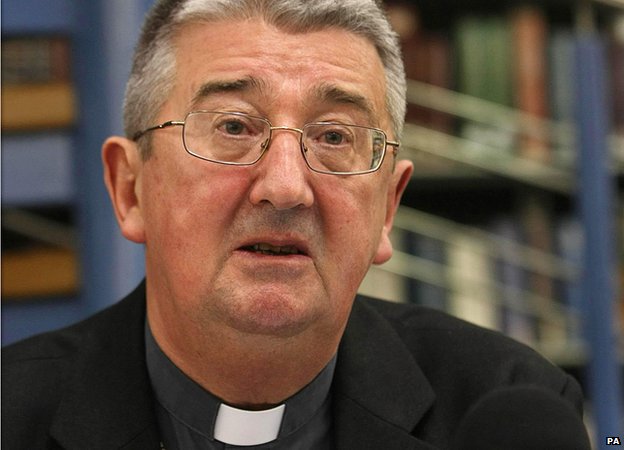
The archbishop personally voted “No” arguing that gay rights should be respected “without changing the definition of marriage”.
“I ask myself, most of these young people who voted yes are products of our Catholic school system for 12 years. I’m saying there’s a big challenge there to see how we get across the message of the Church,” he added.
Ireland is the first country in the world to legalise same-sex marriage through a popular vote, and its referendum was held 22 years after homosexual acts were decriminalised in the Republic of Ireland.
Among those voicing their approval of the outcome was UK Prime Minister David Cameron who tweeted: “Congratulations to the people of Ireland, after voting for same-sex marriage, making clear you are equal if you are straight or gay.”
Analysis
By BBC’s Ireland correspondent Chris Buckler
In Ireland debates about morality tend to be rooted in religion. The discussion about same sex marriage was no exception.
The Catholic Church after all still has much influence in Ireland and the no vote was strongest in rural areas where church attendance figures tend to be higher. That sharply compared to the cities where the yes campaign never doubted their support.
There was also a generational divide – with the yes campaign capturing the interest and enthusiasm of young people in a way that few elections do. Some living abroad even returned home to Ireland simply to visit the ballot box.
The Catholic Church is not immune from the influence of an increasingly liberal Ireland.
In his appeal for a no vote the church’s most senior figure In Ireland specifically recognised the love shared between same sex couples.
That is a softening of language and in its own way a sign of wider change.
In total, 1,201,607 people voted in favour of same-sex marriage, while 734,300 voted against.
Out of 43 constituencies, only the largely rural Roscommon-South Leitrim had a majority of “no” votes.
The yes vote means an amendment will be made to Article 41 of the constitution, stating that being of the same sex is no longer an impediment to marriage.
The government must bring in a new law, the Marriage Bill 2015, to give effect to the amendment and it says it hopes to do that by the time the Irish parliament breaks up in the summer.
This means the first actual marriages are unlikely to take place until September.
Same-sex marriage is now legal in 20 countries worldwide.
What the ‘yes’ vote means
The Republic of Ireland has a written constitution which can only be changed by referendum.
Now that the proposal has been passed, a marriage between two people of the same sex will have the same status under the Irish constitution as a marriage between a man and a woman.
They will be recognised as a family and be entitled to the constitutional protection for families.
Civil partnerships for same-sex couples have been legal in Ireland since 2010, giving couples legal protection which could be changed by the government.
However, married gay people will now have a constitutional standing that can only be removed by another popular vote.
According to the Irish Times, there will be no new civil partnerships from the day the law comes into effect, and although civil partners will retain their existing rights, there will be no automatic upgrade from partnership to marriage.
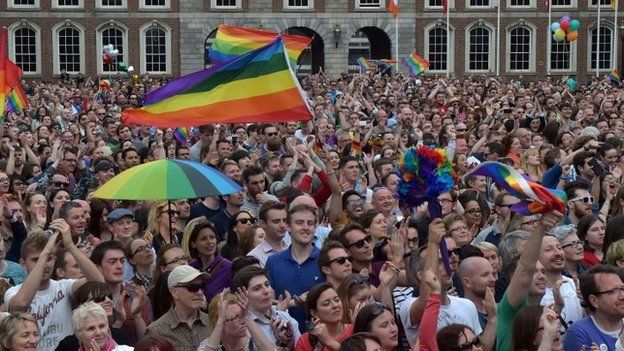
Complete Article HERE!
Tears and celebrations likely to follow as Ireland says Yes
Young were given something they could believe in – campaign for and vote for

By Fiach Kelly
The counting is continuing, but the smiles of all those who voted Yes are widening.
The chests of Yes campaigners are being pushed out; the tears and celebrations are likely to follow when confirmation of the results are announced in Dublin Castle.
Not only has Ireland has agreed to same-sex marriage, it has done so in a louder voice than many could have imagined, carried on the back of a remarkable turnout and an engagement by younger people not seen in years.
Following years of the politics of recession and bailout, the young were given something they could believe in, campaign for and vote for. And they did.
For campaigners, the main task was to tap into this latent goodwill and desire to make a societal change a generation could claim as its own.
The campaign became about more than just same-sex marriage. It became a debate about the place of the gay community in Irish society and the country’s acceptance of it.
Yes Equality, the umbrella organisation comprised of a number of groups, deserves enormous credit for the drive and organisational skill it has shown in recent weeks.
That’s not to say it was all plain sailing. There were wobbles. One came around the Easter period when many in politics felt the Yes campaign was talking to itself, although this was swiftly rectified with a focus on personal stories and the experiences of gay people and their families.
The term “national conversation” is one of the most horrible phrases to enter public debate in recent years, but the campaign offered something along those lines. Many gay people felt comfortable to speak about themselves and who they are, winning the arguments in their families and communities.
A second wobble came two weeks ago as the No side gained traction with issues such as surrogacy and adoption, and the absence of opinion polls, coupled with fears of a shy No vote, increased nerves.
Again this was rectified by personal stories, the most powerful of which was from journalist Ursula Halligan, and interventions by people such as Daniel O’Donnell.
Yes campaigners took heart and many in the political and media bubble predicting doom were out of step with the country. Canvass returns from the last month told the Yes side they would win, and win well.
The campaign was not party political, but the parties can take credit today. Labour championed same-sex marriage from the outset of the Government’s term, and before. Eamon Gilmore’s role in pushing it on to the agenda must be also be acknowledged.
After initial reticence, the Taoiseach took on a leading role in the campaign and Fine Gael pushed as if the issue were its own. Maybe it sensed an avenue to broaden the party’s appeal to different sections of the electorate but many in the party believed deeply in it, even if the enthusiasm wasn’t shared by some of its conservative members.
Credit too must go to Fianna Fáil leader Michéal Martin and Sinn Féin, both of whom could have opposed the referendum for narrow political gain but chose not to. Mr Martin in particular had to deal with the fact that not only were many of his rank and file members against the proposal, some of his TDs opposed it too.
Yet, this one was largely for the younger generation, which turned out in its droves. Stories of emigrants returning home to vote and huge increases in voter registration offered indications of what was to come but the final results were astonishing.
Campaigners said those on the supplementary register were overwhelmingly young, and the turnout showed they proved the old adage that they don’t vote wrong.
All across the country, the turnout on the supplementary register hovered around 90 per cent, even reaching 99 per cent in Huntstown, west Dublin, by close of polls.
Such enthusiasm can be infectious and perhaps convinced older, sceptical voters not to stand in the way of something younger generations believed in.
Complete Article HERE!
Priests Defy Bishops To Support Marriage Equality In Ireland
There is a battle going on within the Irish Catholic Church at the moment.
Father Martin Dolan faced a difficult decision. With Ireland’s referendum on marriage equality looming, he could either go along with his bishops’ official opposition to it, or he could be honest with his Dublin congregation.
He made his choice during a Saturday evening mass in January. Not only did he urge his congregation to vote Yes on May 22, he also took the opportunity to come out as gay.
The worshipers greeted the revelation with a standing ovation.
Dolan is one of at least 10 members of Catholic orders who have publicly endorsed marriage equality. They have been willing to defy their bishops, suggest progressive priests, because they see the referendum as just the latest skirmish in a long-running war. As church attendance has plummeted, progressives argue they are trying to save the church from the wounds inflicted by a moribund and authoritarian leadership.
“There is a battle going on within the Irish Catholic Church at the moment,” said Father Iggy O’Donovan, a priest from Limerick who called for a Yes vote in a letter to the Irish Times in March. “There’s a group of us, we try to still hold on to the belief that Catholicism is compatible with modernity … [while] the church is dying at [the bishops’] feet,” he said in an interview with BuzzFeed News.
Progressive factions across the Catholic world have been emboldened by Pope Francis to confront the conservatives who dominated under Popes Benedict and John Paul II. The church has a particular interest in overhauling itself in countries like Ireland, where weekly attendance fell from around 86% in 1990 to less than 40% in 2012. That decline was largely due to revelations of widespread child sexual abuse, which coincided with economic changes that took more and more Irish people to more secular European countries for work.
With popular support for the referendum consistently showing overwhelming support in opinion polls, many Irish bishops appear worried that a misstep on the referendum could further marginalize the church. Indeed, their initial public statements were so muted it seemed they simply wanted to get through the campaign unscathed.
But the bishops have never wavered in their opposition to same-sex marriage, making it hard to maintain a conciliatory tone in an environment where LGBT rights supporters have successfully framed the referendum as the ultimate test of equality. And Pope Francis hasn’t provided a clear answer to this conundrum; while he has tried to moderate the church’s language on homosexuality and even raised the possibility that civil unions could be acceptable to the church, he has always firmly opposed full marriage rights for same-sex couples as well.
And so, for the global church, there is more at stake than the outcome of the vote itself — Ireland is the clearest test case yet of the strength of the progressive movement under Francis.

In a sign of how deep this disagreement may run within the Irish church, it is possible that hundreds of Irish priests could vote Yes on Friday, based on the internal discussion of the left-leaning Association of Catholic Priests. The group was formed in 2010 out of frustration with the bishops’ handling of child sex abuse allegations, and now has 1,070 members — around one-third of the country’s priests, according to one of its organizers, Father Brendan Hoban.
When the Association asked its members what position to take on the referendum, Hoban told BuzzFeed News, the group “split down the middle,” so it decided to take no public stand. The group’s founder, Tony Flannery — a priest who was suspended by the Vatican in 2012 for challenging the church’s historical legitimacy and advocating positions like the ordination of women — told BuzzFeed News he thought around 25% of the country’s clergy might yet cast a Yes vote.
Opponents of the marriage equality referendum disagree with the way some of its advocates have framed the debate as a question of whether Ireland is a modern secular country or still beholden to a backward-looking church. Opponents — even the bishops — maintain that their arguments against the referendum aren’t based in religion at all but rather they are making a secular case warning that marriage equality will cause harm to society. Their primary case against it is that treating heterosexual and homosexual couples the same would harm children, who, they claim, would no longer be legally entitled to grow up with both a mother and a father.
“If this is framed as Catholic Ireland versus modern Ireland, it’s the wrong way to frame it,” said David Quinn, head of the Iona Institute, a conservative Catholic think tank in Dublin and a driving force behind the No campaign. “The arguments for and against are ultimately secular, not religious.”
But, Quinn told BuzzFeed News, there was “no question” that the push for same-sex marriage rights was part of a “secular reaction against the years of Catholic dominance in Ireland.”
In this environment, Ireland’s bishops have been so cautious in their opposition that their major statement against the referendum at the start of the campaign didn’t even call for voters to cast No ballots. The closest thing to a battle cry offered by a resolution released in March was this: “We say to all voters: Marriage is important — reflect before you change it.”
A March speech by Archbishop Diarmuid Martin showed how some of the bishops are looking to apply the model offered by Pope Francis.
“There is a radical difference between marriage between a man and a woman and the union of two people of the same sex. But we must also welcome people as they are,” he said at a talk hosted by the Iona Institute. He also chastised those who have spoken against the referendum in language that is “not just intemperate but obnoxious, insulting, and unchristian in regard to gay and lesbian people.”
But this tone has won the bishops a different kind of backlash — the editor of a Catholic newspaper later suggested Martin would “have to accept some responsibility” if the referendum passes because there hasn’t been “a clear campaign by the hierarchy” against it. And Martin even faced hecklers during his speech who questioned whether he actually opposed the referendum at all.

The bishops now seem to have grown concerned about such criticism from the right — or, with opinion polls still showing a firm lead for Yes despite a tightening race in the campaign’s final week, their caution has been overtaken by a concern the referendum will pass.
Archbishop Diarmuid Martin began a speech on May 6 saying, “I think I should begin by saying that I intend to vote No in the upcoming referendum on marriage,” a disclosure he said was a response to the suggestion that he had “given constant solace to the Yes campaign.”
That was part of a broader shift to more active opposition from the bishops. On May 1, archbishop of Armagh Eamon Martin issued a statement urging people to “speak up courageously for the union of a man and a woman in marriage.” Over the following weekends, bishops circulated further statements opposing the referendum throughout Ireland, though many hewed closely to the argument that urged people to “think before you change” marriage.
“In a sense, the church has placed itself in a no-win situation,” said Father Brendan Hoban of the Association of Catholic Priests. “If the Yes vote wins it’ll be seen as a defeat for the church; if the ‘no’ vote wins there will be more anger heaped on the church as being responsible for its defeat.”
The clergy publicly supporting the Yes side have given a range of reasons for their vote. In his March letter to the Irish Times, Father Iggy O’Donovan argued that the church members should vote Yes in the name of pluralism in a secular state. Some, like the well-known activist nun Sister Stanislaus Kennedy, seem ready to question church teaching on homosexuality more fundamentally.
“I am going to vote Yes in recognition of the gay community as full members of society,” she told the Irish Times last week. “They should have an entitlement to marry. It is a civil right and a human right.”
Perhaps as extraordinary as these statements from members of Catholic orders is the fact that the bishops don’t appear to be disciplining them — or at least not yet.
The hierarchy has in the past taken steps to silence internal critics; Father O’Donovan, for example, was sent to Limerick after being removed from the congregation he had long led in the town of Drogheda in 2013. But he said he had “heard nothing from the hierarchy” about his letter, and Father Martin Dolan told BuzzFeed News that “no one has told me I cannot speak” about the referendum after he came out in January, though he said he was “not giving interviews at this time.”
This is the most hopeful sign that the Irish church is growing under Francis, suggested Association of Catholic Priests’ Father Tony Flannery.
“The fact that these people nowadays feel they can oppose the official church in public … that in itself is a real indication of the Francis effect in the Irish church,” he said.
But it’s not clear how Francis’ desire to extract the church from culture wars can be applied when the church is directly confronted with a marriage equality movement. Francis’ gentler tone as pope followed his own experience unsuccessfully combating a 2010 marriage equality bill in Argentina when he was the country’s top bishop, deploying rhetoric that even church conservatives concede embarrassed the church. And he has appeared to wade into marriage fights even as pope when conservatives were favored to win.
If the amendment passes, Ireland will be the first country in the world to establish marriage equality by a popular vote. This historic vote comes just five months before bishops from around the world are due to come to Rome for what is known as a synod, which follows a three-year process launched by Pope Francis to review church teaching on the family. The process has largely been viewed as a litmus test of how much the church can moderate its condemnation of homosexuality — a draft discussed in a meeting last October included language that spoke of “welcoming homosexual persons,” but it was rejected by the bishops and no language on same-sex couples got enough votes to be adopted in that meeting.
The Irish campaign is unlikely to make reaching an accord any easier in this year’s synod. But it’s a stark reminder as to why it’s so important that the church continues to work toward a third way in marriage fights, which are spreading faster and faster in many countries where the church has only just begun to slip from the center of power.
And the stakes are high in Ireland, said Father O’Donovan.
“There’s an angry sea, and the hierarchy are the first rocks on the shore who will have to face it,” he said. “If [the referendum] fails … it will be a pyrrhic victory” that will damage the church in the long run.
And if it passes, he said, the vote will be “the latest nail in the coffin of old Catholic Ireland.”
Complete Article HERE!
Marriage Equality: Bring Your Family With You
Our Job
Pope Francis reaches out to gays, says he won’t judge gay priests
Pope Francis reached out to gays on Monday, saying he wouldn’t judge priests for their sexual orientation in a remarkably open and wide-ranging news conference as he returned from his first foreign trip.
“If someone is gay and he searches for the Lord and has good will, who am I to judge?” Francis asked.
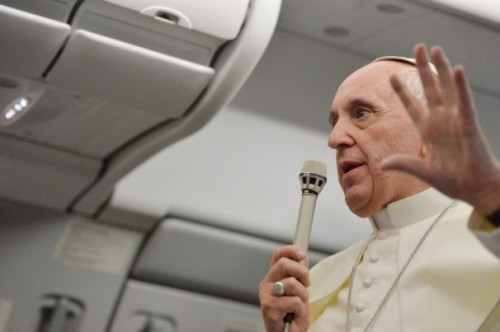 Pope Francis urged young Catholics to shake up their dioceses and get out and preach during his trip to Rio de Janeiro.
Pope Francis urged young Catholics to shake up their dioceses and get out and preach during his trip to Rio de Janeiro.
His predecessor, Pope Benedict XVI, signed a document in 2005 that said men with deep-rooted homosexual tendencies should not be priests. Francis was much more conciliatory, saying gay clergymen should be forgiven and their sins forgotten.
Francis’ remarks came Monday during a plane journey back to the Vatican from his first foreign trip in Brazil.
He was funny and candid during his first news conference that lasted almost an hour and a half. He didn’t dodge a single question, even thanking the journalist who raised allegations reported by an Italian newsmagazine that one of his trusted monsignors was involved in a scandalous gay tryst.
Francis said he investigated and found nothing to back up the allegations.
Francis was asked about Italian media reports suggesting that a group within the church tried to blackmail fellow church officials with evidence of their homosexual activities. Italian media reported this year that the allegations contributed to Benedict’s decision to resign.
Stressing that Catholic social teaching that calls for homosexuals to be treated with dignity and not marginalized, Francis said it was something else entirely to conspire to use private information for blackmail or to exert pressure.
Francis was responding to reports that a trusted aide was involved in an alleged gay tryst a decade ago. He said he investigated the allegations according to canon law and found nothing to back them up. But he took journalists to task for reporting on the matter, saying the allegations concerned matters of sin, not crimes like sexually abusing children.
And when someone sins and confesses, he said, God not only forgives but forgets.
“We don’t have the right to not forget,” he said.
The directness of his comments suggested that he wanted to put the matter of the monsignor behind him as he sets about overhauling the Vatican bank and reforming the Holy See bureaucracy.
Speaking in Italian with occasional lapses in his native Spanish, Francis dropped a few nuggets of other news:
— He said he was thinking of traveling to the Holy Land next year and is considering invitations from Sri Lanka and the Philippines as well.
— The planned Dec. 8 canonizations of Popes John Paul II and John XXIII will likely be postponed — perhaps until the weekend after Easter — because road conditions in December would be dangerously icy for Poles traveling to the ceremony by bus.
— And he solved the mystery that has been circulating ever since he was pictured boarding the plane to Rio carrying his own black bag, an unusual break from Vatican protocol.
“The keys to the atomic bomb weren’t in it,” Francis quipped. Rather, he said, the bag merely contained a razor, his breviary prayer book, his agenda and a book on St. Terese of Lisieux, to whom he is particularly devoted.
Complete Article HERE!


